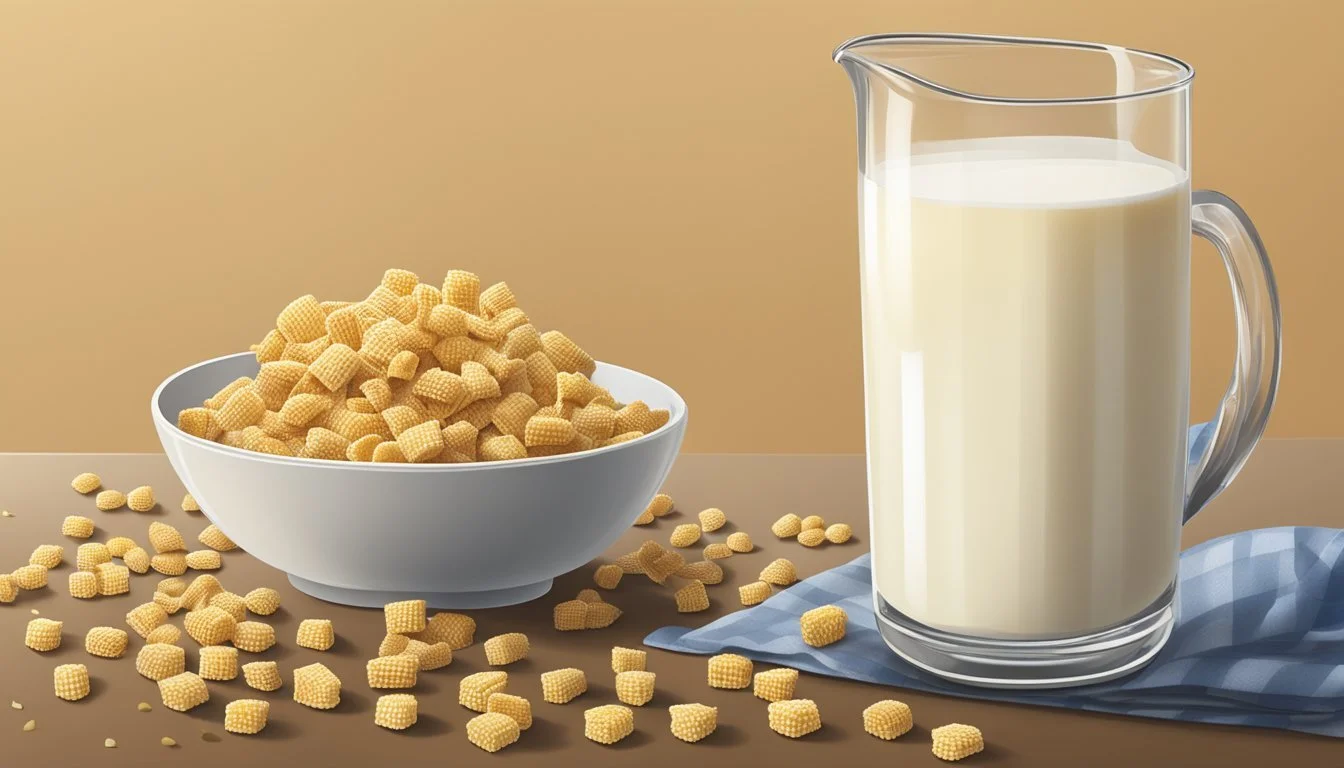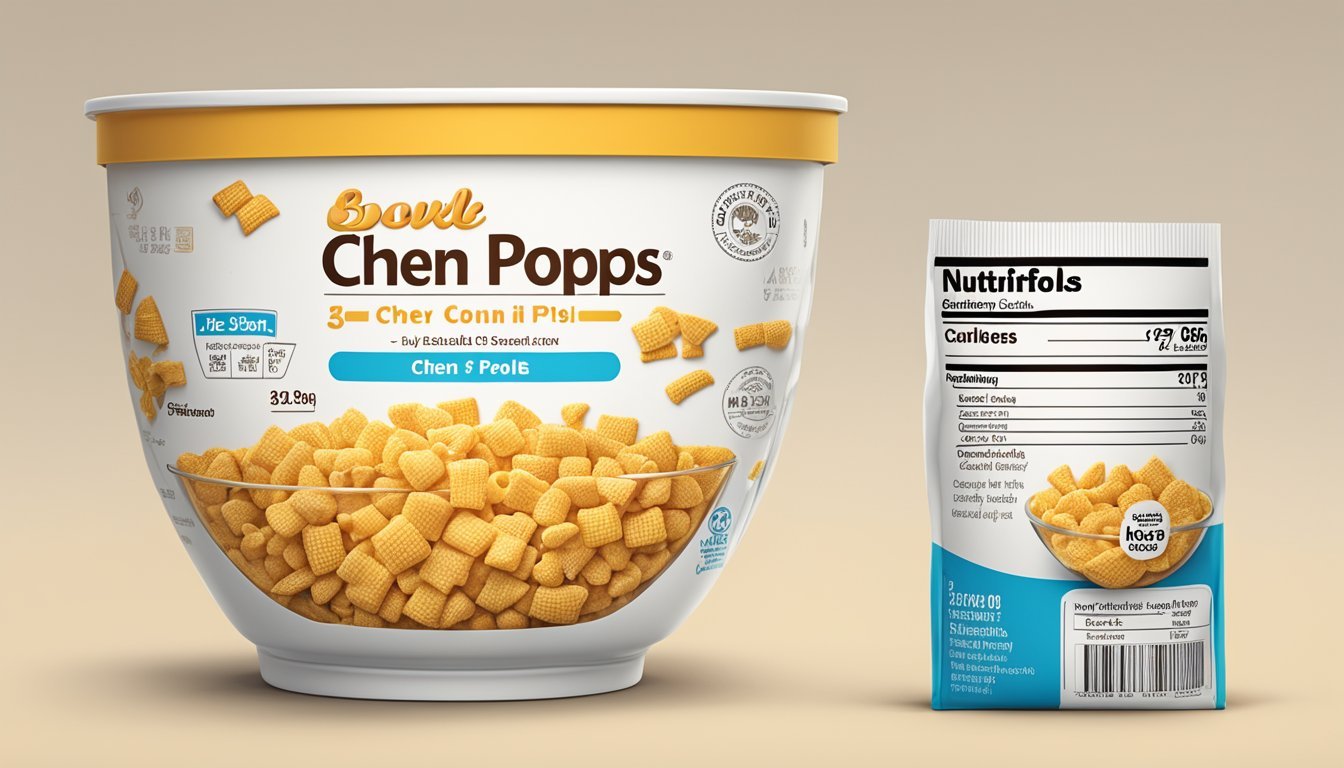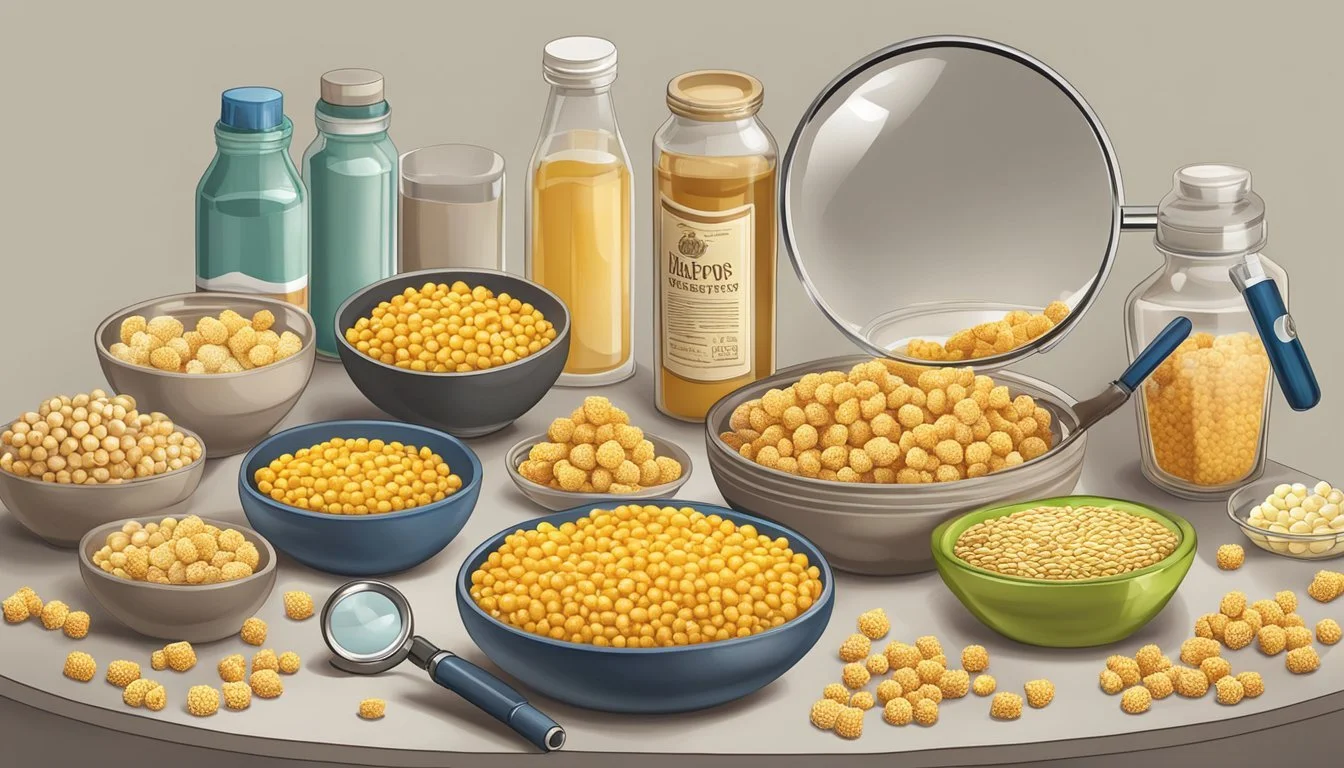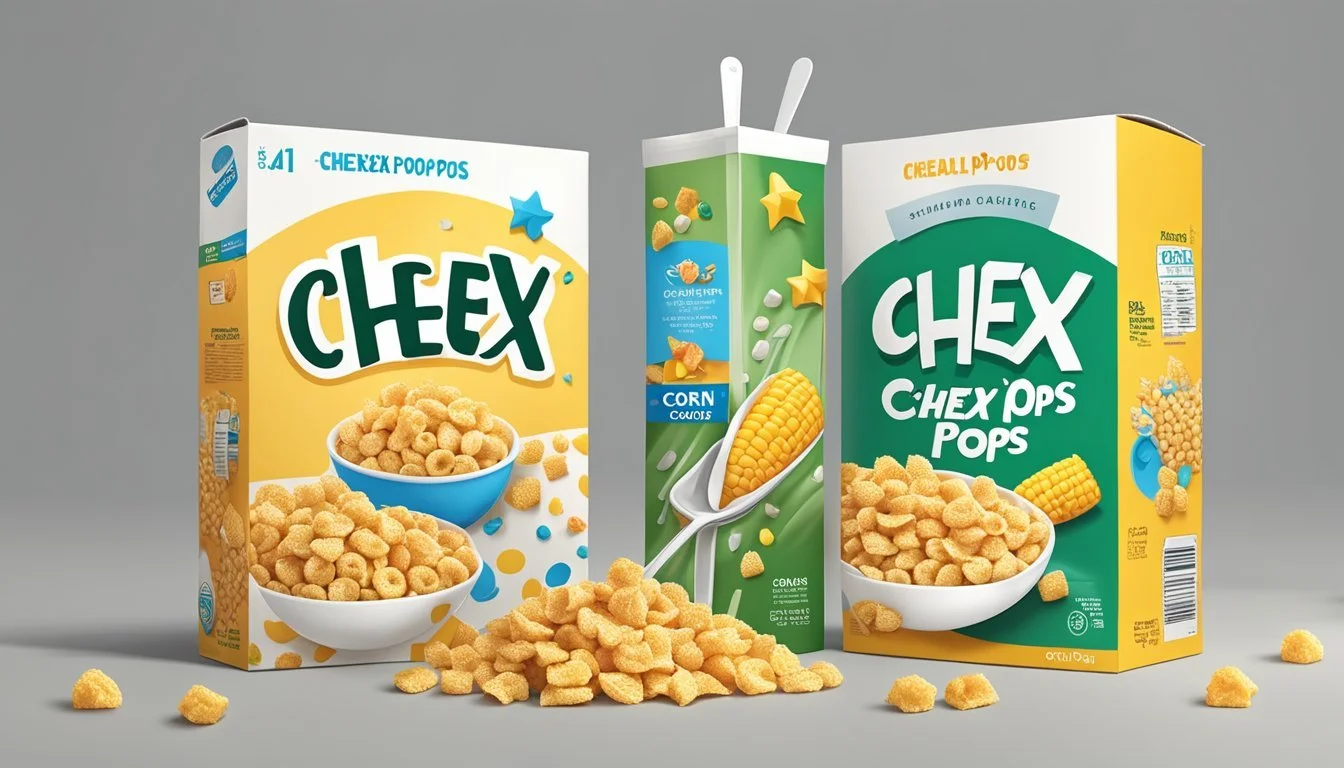Chex vs Corn Pops
Comparing Popular Breakfast Cereals
This Article is Part of Our Breakfast Cereal Guide with Details on Chex Nutrition and Corn Pops Nutrition
When debating whether Chex or Corn Pops is the healthier choice for breakfast, it’s important to look at several nutritional factors. Chex cereals typically offer a higher content of complex carbohydrates compared to Corn Pops. For instance, Corn Chex provides 22.0 grams of complex carbohydrates per serving, while Corn Pops offers just 13.0 grams. This makes Chex a more substantial source of sustained energy.
Corn Chex also excels in providing more essential nutrients, often containing higher levels of vitamins and minerals necessary for a balanced diet. In contrast, Corn Pops tend to have higher sugar content but may lack significant levels of fiber and protein, making them a less ideal option for those aiming for a nutritious start to their day.
Both Chex and Corn Pops have their unique flavors and textures, appealing to different tastes and preferences. While Corn Pops might attract those who enjoy a sweeter cereal, Chex provides a more versatile option that can be enjoyed with various toppings and mix-ins, enhancing its overall nutritional profile.
History and Origin
Chex and Corn Pops are two iconic cereals with rich histories rooted in mid-20th century America. Each developed unique traits that contributed to their longstanding popularity.
Development of Chex
Chex, a product of General Mills, began with the release of Wheat Chex in 1937. Corn Chex followed in 1958. However, Chex's influence expanded significantly with the creation of Chex Mix. This homemade snack, popularized by the wife of a Ralston Purina executive at a holiday party in 1955, eventually became a prepackaged product in 1987. The snack mix features Chex cereal combined with various other ingredients like pretzels, bagel chips, and melba toast, cementing Chex as both a breakfast and snack staple.
Evolution of Corn Pops
Kellogg’s Corn Pops made their debut in 1950 as "Corn Pops." Initially a straightforward puffed corn cereal, they underwent a name change to "Sugar Corn Pops" in 1951, reflecting the sweetened taste. They later reverted to "Corn Pops." Corn Pops achieved widespread fame through sponsorship of "The Adventures of Wild Bill Hickok," a popular radio and TV show in the early 1950s. This high-profile marketing push helped establish Corn Pops as a breakfast favorite, maintaining its appeal through continual branding and slight recipe adjustments to keep up with modern tastes while remaining true to its original crunchy, sweet flavor.
Nutritional Profile
Corn Chex and Corn Pops differ significantly in their nutritional content, affecting their suitability for various dietary goals. Examining macronutrient composition, vitamins and minerals, and specific dietary considerations will provide a clearer picture of their nutritional values.
Macronutrient Content
Corn Chex offers a balance of macronutrients per serving. Each 1 and 1/4 cup serving (39g) provides:
Calories: 150 (190 with milk)
Protein: 2g
Fat: 0.5g
Carbohydrates: 33g
Fiber: 2g
Sugars: 3g
Sodium: 280mg
Corn Pops in contrast, per 1 cup serving (30g) provides:
Calories: 120
Protein: 1g
Fat: 0g
Carbohydrates: 29g
Fiber: less than 1g
Sugars: 9g
Sodium: 110mg
Vitamins and Minerals
Corn Chex is fortified with several essential nutrients. Key vitamins and minerals per serving include:
Vitamin B6: 25% FDA Daily Recommendation
Iron: 50% FDA Daily Recommendation
Zinc: 25%
Calcium: Contains some amount, enhanced when served with milk.
Corn Pops also contains added vitamins and minerals. Key vitamins and minerals per serving include:
Vitamin B6: 25% FDA Daily Recommendation
Iron: 25%
Zinc: 10%
Calcium: Contains some amount, enhanced when served with milk.
Dietary Considerations
Corn Chex is notably high in sodium at 280mg per serving. This might be unsuitable for individuals monitoring salt intake. It contains whole grains and no artificial flavors or colors, appealing to those seeking more natural ingredients.
Corn Pops has added sugars at 9g per serving, which is higher than Corn Chex, making it less ideal for those limiting sugar consumption. It contains less fiber (less than 1g) compared to Corn Chex, offering lower dietary fiber benefits.
Both cereals offer different advantages and downsides based on an individual's dietary needs and health goals.
Ingredients Analysis
Corn Chex and Corn Pops have different ingredient compositions that may appeal to different health preferences. This section breaks down their primary grains used, their respective sugar contents, and suggests healthier alternatives.
Primary Grains Used
Corn Chex mainly utilizes whole grain corn as its primary ingredient. Whole grains are valued for their higher fiber content and essential nutrients, making them a healthier option compared to refined grains.
Corn Pops, on the other hand, also use corn but it is not specified as whole grain. This may provide less fiber and fewer nutrients than whole grain options.
The choice of grains impacts the nutritional value significantly, making whole grains the preferred choice for a healthy breakfast.
Sugar Content
Corn Chex contains around 3 grams of sugar per serving. This relatively low sugar content makes it a decent option for those trying to reduce their sugar intake.
Corn Pops have a higher sugar content, with mostly double-digit grams of sugar per serving. This can contribute to higher caloric intake and may not be ideal for people managing their sugar levels.
Monitoring sugar intake is crucial for overall health, influencing decisions on which cereal to choose for a healthier breakfast.
Healthier Alternatives
Shredded Wheat and Fiber One are excellent alternatives for those seeking a healthier option. Shredded Wheat contains whole grain wheat and usually has no added sugars.
Fiber One focuses on high fiber content, offering significant digestive benefits. These cereals measure well in both high fiber and low sugar per serving.
For individuals looking to improve fiber intake, these alternatives provide substantial benefits without the extra sugars found in Corn Pops.
Cereal Varieties and Flavors
Both Chex and Corn Pops offer a variety of flavors and types, catering to different taste preferences and nutritional needs.
Variants of Chex
Chex cereals come in multiple varieties, each with distinct ingredients and flavors. The core variants include Corn Chex, Rice Chex, and Wheat Chex. These are made using whole grains and are known for their versatility in both breakfast settings and recipes like Chex Mix.
Corn Chex offers a balance of taste and nutrition with 22 grams of complex carbohydrates per serving. Rice Chex is popular for its light texture, though it has lower fiber, containing no dietary fiber per serving. Wheat Chex is often favored for its higher fiber content, making it a wholesome option for those seeking nutritious, whole-grain cereals.
Corn Pops Product Line
Corn Pops, manufactured by Kellogg's, primarily focuses on a single, consistent flavor that is sweetened corn. Each serving has 110 calories, 90 milligrams of sodium, and 1 gram of dietary fiber.
While Corn Pops may not offer varied flavors like Chex, its classic taste appeals to those looking for a sweet and crunchy cereal option. It does not compete in variety but maintains a steady presence in breakfast cereals with its simple and enjoyable flavor profile.
Consumer Information
Both Chex and Corn Pops offer various details that are valuable for consumers, such as packaging specifics, serving sizes, price points, and availability. These factors play a significant role in choosing the right breakfast cereal.
Packaging and Serving Sizes
Chex cereals generally come in family-sized boxes with packaging that emphasizes the cereal’s health benefits and USDA nutrition information. Each serving is typically 1 cup (28 grams), aligning with FDA recommendations for portion sizes.
Corn Pops, produced by Kellogg’s, are also available in family-sized packs. The usual serving size is around 1 cup (32 grams). Both cereals include nutrition facts on the packaging, allowing consumers to easily compare calories, fat, and carbohydrates.
Cereal Serving Size Ounces per Serving Corn Chex 1 cup 1 oz Corn Pops 1 cup 1.12 oz
Pricing and Availability
Chex cereals, manufactured by General Mills, are widely available in major grocery stores and through online retailers. Prices can vary, but a standard family-sized box usually ranges from $3.50 to $5.00 depending on the retailer and geographic location.
Kellogg’s Corn Pops are also readily accessible in grocery stores and online. Pricing for Corn Pops tends to be slightly higher, generally between $4.00 and $5.50 for a family-sized box. Sales and discounts are often available, making both cereals competitively priced.
Grocery stores often place these cereals in the breakfast aisle, making them easy to find. Availability can depend on the area, but both brands maintain a strong presence in most regions.
Brand Profiles
The profiles of General Mills and Kellogg's reveal their unique approaches to market positioning and product differentiation within the competitive breakfast cereal industry.
General Mills' Approach
General Mills positions itself as a manufacturer of wholesome and nutritious cereals. It emphasizes whole grain ingredients, as seen in products like Cheerios and Corn Chex.
Cheerios, for instance, feature whole grain oats and low sodium content, making it a suitable choice for those on low-sodium diets. Corn Chex also shares these health-focused attributes, although it has higher sodium and very little dietary fiber.
These cereals highlight General Mills' commitment to health-conscious products, aiming to balance taste with nutritional benefits. This strategy aligns with consumer trends prioritizing health and wellness.
Kellogg's Market Strategy
Kellogg's leverages a different market strategy focusing on mainstream appeal and balanced diet options. Special K and Corn Pops epitomize this approach, designed for broader audience appeal.
Corn Pops provide a mix of moderate calories and essential nutrients. While higher in sugar, they offer a small amount of protein, appealing to those seeking balance rather than strict health benefits. Special K targets weight management with lower calorie counts and added vitamins.
Kellogg's aims to attract a varied demographic with diverse nutritional needs, from health-conscious individuals to those looking for balanced indulgence. This broad market strategy allows Kellogg's to capture a wide range of consumer preferences.






